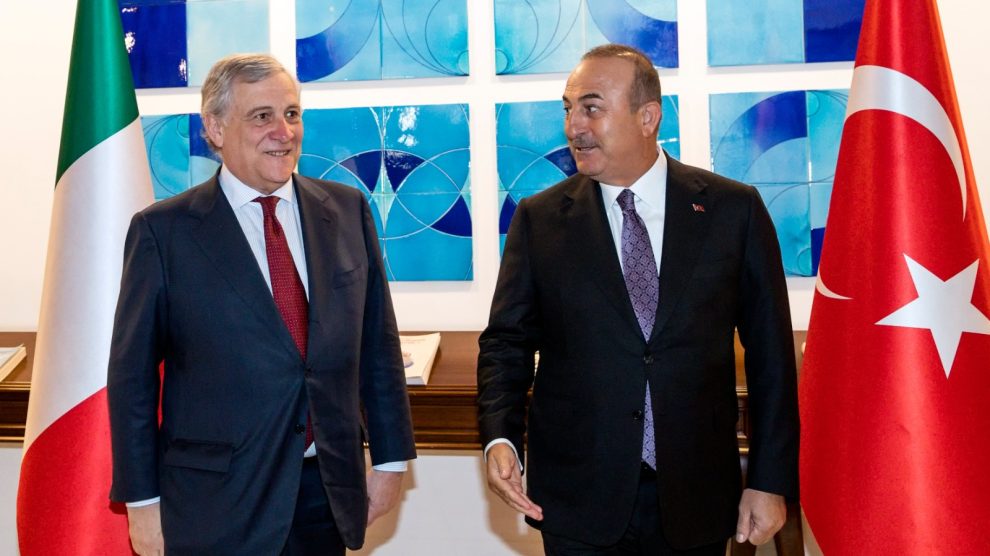Italy’s increased focus on the MENA area. As Prime Minister Giorgia Meloni stated at the Rome Med conference in December – and as Deputy Foreign Minister Edmondo Cirielli told us this week – the government is keen to build a newfound centrality in the wider Mediterranean area and step up its engagement with countries in the Middle East and North Africa region.
- That’s the underlying driver of a raft of upcoming diplomatic trips. Top Italian officials – notably, the PM herself, Foreign Minister Antonio Tajani and Defence Minister Guido Crosetto – are slated to travel across the area in the coming weeks. Here’s where they’ll go and what they will discuss.
Meloni in Algeria. By the end of the month, the Italian PM will make her first official bilateral visit abroad in Algeri, where she’ll most likely meet her counterpart Aimen Benabderrahmane. Quite possibly, she might also shake hands with President Abdelmajid Tebboune – as her predecessor Mario Draghi did multiple times in 2022.
- As Italy diversified away from Russian gas, Algeria ended up becoming its biggest gas partner, promising to cover roughly 40% of its overall gas needs.
- Those deals came along with increased cooperation, including substantial Italian investments in Algeria renewable energy, industry and infrastructure, as well as collaboration on justice and security.
- Given the consolidation of ties and PM’s Meloni focus on energy security, one can easily expect increased cooperation and assurances – perhaps in the form of new bilateral agreements.
Tajani in Turkey… Meanwhile, on Friday, the Italian Foreign Minister (and Deputy Prime Minister) initiated a Mediterranean trip by touching down in Ankara to meet his counterpart Mevlüt Çavuşoğlu and discussing a host of matters, especially migration, security and commerce. Later, Minister Tajani thanked Minister Çavuşoğlu for the meeting; he stressed that “the fight against illegal immigration is a strategic priority of our governments,” as well as stabilising Libya, and that the two countries are “working to strengthen our economic relations.”
- President Recep Tayyip Erdoğan has been consolidating its status as a regional power broker, especially vis-a-vis Libya. As such, strengthened dialogue can aid Rome’s push to increase relations and regional security.
- Minister Tajani stressed the need for a strong commitment on behalf of Med countries to counter irregular departures and encourage returns. Interior Minister Matteo Piantedosi will also travel to Turkey to meet his homologue, Süleyman Soylu, on Monday, to discuss the issue.
- Turkey is of strategic importance in countering migration fluxes. The Turkish-Greek route accounted for about 15% of arrivals in Italy by sea in 2022, after the Libyan route (roughly 50% of arrivals) and the Tunisian route (30%).
- “We are well aware that Ankara is as much a partner as a competitor,” noted Arturo Varvelli, Director of the Roman office of the European Council on Foreign Relations. “But there are various possibilities for cooperation, though by no means simple, [in] Libya and the eastern Med. Testing these opportunities is the task that Minister Tajani, and the government, now face.”
… Libya… Minister Tajani’s next (announced, as of yet undated) stop will be Tripoli, where political strife and conflicting factions are still preventing a unitary government from taking shape and holding elections. Italy, within the United Nations and European Union frameworks, is working in that direction.
- Rome is also coupling its contribution to the UN-mandated arms embargo with its own concerns, notably migration-centred patrolling efforts and training the Libyan Coast Guard.
- The country’s political instability remains an obstacle to increasing the wider Mediterranean’s overall security. By working through diplomatic channels and offering logistical support, Italy remains committed to the peace process – which will require a great deal of work and inter-party collaboration.
- “The Italian executive intends to avoid unrealistic moves and work in partnership with allies,” noted Mr Varvelli, “taking advantage of the renewed attention that the United States [is paying to] the North African dossiers” – such as the CIA director’s recent trip, the planned Washington meeting between special envoys on Libya, and the US pressure on Tunis to comply with the IMF’s instructions, he said.
… and Tunisia. The Italian Foreign Minister’s last stop will be Tunis, another capital plagued by institutional tremors. Notwithstanding the Tunisians’ dismal public participation figures, President Kais Saied’s efforts to consolidate power in his own hands are encountering some roadblocks from the opposition and civil society. Meanwhile, the country remains in the grips of a long-running economic crisis.
- According to Mr Varvelli, the country is “at real risk of economic collapse, and thus the opening of a chaotic season that could also favour migratory dynamics which the Italian government pays special attention to.” In turn, Rome “has every interest in placing [the issue] among the EU’s priorities abroad.”
- Rome’s commitment revolves around political assistance, especially concerning Tunis’ access to the International Monetary Fund’s financial support.
- Interior Minister Piantedosi, too, will travel to Tunis with a deal: a legal entry quota in exchange for an increase in the repatriation of illegitimate Tunisian migrants.
- However – as Minister Tajani recalled in a recent conversation with his Tunisian counterpart – other forms of cooperation are flourishing. Beyond controlling migratory flows, the countries’ economic partnership extends to energy (a Tunisia-Sicily power line is in the works) and commerce.
Crosetto went to Azerbaijan. The Italian Defence Minister’s visit to Baku on Thursday was centred on defence and energy security. Mr Guido Crosetto met with President Ilham Aliyev, Defence Minister Colonel General Zakir Hasanov and the head of the security services, Colonel General Ali Naghiyev.
- “Italy confirms its contribution to further strengthening relations between Azerbaijan and NATO and between Azerbaijan and the EU,” stated Minister Crosetto. President Aliyev, on his part, described the bilateral relationship as “especially fruitful,”, particularly in the energy sector.
- Azerbaijan is the starting point of the Southern Gas Corridor (SGC), a gas pipeline that reaches into Europe (through Georgia and Turkey) by way of Greece and Italy and is crucial in helping the continent to move away from Russian gas.
- Baku and Rome signed a protocol of intent for cooperation in military matters, especially in the field of training and education of the Azerbaijani armed forces.
Image: Minister Tajani’s Twitter profile





